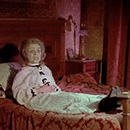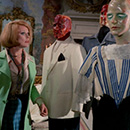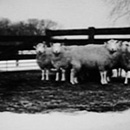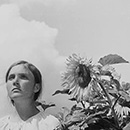CRUCIAL VIEWING
Mario Bava’s BLACK SABBATH (Italian Revival)
Gene Siskel Film Center – Saturday, 3pm and Thursday, 6pm
In between making two giallo film’s THE GIRL WHO KNEW TOO MUCH and BLOOD AND BLACK LACE, Mario Bava released BLACK SABBATH. This horror anthology consists of three tales: “The Telephone”, “The Wurdalak”, and “The Drop of Water”. Each sequence has an introduction and conclusion by Boris Karloff in a style later used in TALES FROM THE CRYPT. In “The Telephone”, a young prostitute receives threatening phone calls from her former pimp, Frank, who was just escaped from prison. As the phone calls become more ominous, she invites her estranged friend (who also used to work for Frank) over to help her feel safe, but her friend’s true motivations are revealed to be nefarious. In “The Wurdalak”, a Russian man discovers a man’s body and shortly after he stumbles upon a cottage with a family who’s patriarch, Gorca (Karloff), has yet to return from hunting a wurdalak (a vampire-like creature that feasts on the blood of the living). When the wurdalak reveals itself, the family is scattered and a game of cat and mouse ensues. In “The Drop of Water”, Nurse Helen Chester (Jacqueline Pierreux) is called to prepare the corpse of a recently deceased medium. Upon stealing the medium’s ring and returning home, Helen is tormented by the persistent sound of dropping water, a fly, and visions of the medium’s corpse who wants her ring back even in death. The third story is the film’s strongest by far. Bava’s film received an American release that sought to appeal to a younger audience and so some of the film’s violence was toned down, the order of stories was changed, and the film’s color scheme was cooled to feature more blues instead of reds. Overall, BLACK SABBATH’s tones of paranoia, claustrophobia, and dread make it a strong work from the Italian horror master as the film manages to create the horrifying from everyday items. (1963, 92 min Original European Cut, DCP Digital) KC
Mario Bava’s LISA AND THE DEVIL (Italian Revival)
Gene Siskel Film Center - Saturday, 5pm and Tuesday, 6pm
Towards the tail-end of Italian master Mario Bava’s illustrious career, he made this tale of horror and poetry, a bizarre surreal fantasy called LISA & THE DEVIL. Arguably, there is nothing like this film in the director’s highly colorful career, especially one that reaches this type of formal fantasia; THE WHIP & THE BODY and KILL BABY KILL come close. The plot is loose and generally second to the magic on display, but it features a young tourist named Lisa (Elke Sommer) who after getting lost from her tour group in Spain, encounters a married couple who take her to a haunted house of sorts, where she encounters a strange family and a butler (Telly Savalas) who may or may not be the Devil. The plot threads loosen pretty quickly as events spiral into pure abstraction and Lisa journeys deeper into the night, allowing Bava to unleash his technical wizardry in a way that makes this film his most personal, and certainly one of his most fascinating, though that claim could almost extend to the majority of his output. Every aspect of Bava’s decade-spanning career is featured, from the horror anthology BLACK SABBATH, to the proto-slasher BAY OF BLOOD, allowing the director to affectively sum up every preceding work, at the same time expanding and deepening everything that has made him such an endearing cult figure and the arbiter of one of the most-highly imaginable cinematic dreamworlds ever presented. Arguably, its always been difficult to sum up the plot to any one of his film’s, but the heights he reaches here would convince anyone that the man was, and has always been, a true artist in every sense of the word, transcending the oft-repeated claim that he was first and foremost, a genre workman. His work does reach into many different genres besides horror, including the sword-and-sandal flick (HERCULES IN THE HAUNTED WORLD), the heist film (RABID DOGS aka KIDNAPPED), the sex-comedy (DR. GOLDFOOT AND THE GIRL-BOMBS), a very odd western (ROY COLT & WINCHESTER JACK), and the Biblical epic (ESTHER & THE KING, which he co-directed with fellow genre-man/pioneering-auteur Raoul Walsh). Its easy to underestimate a career like Bava’s, without realizing that the scope of his visions and ideas still haunt the modern cinema very strongly to this day; the man basically gave birth to the giallo film (BLOOD & BLACK LACE), which in turn birthed the slasher-genre, given full life with BAY OF BLOOD. Not only was his genre-ushering completely integral, but the same could extend to his formal playfulness, the dark rooms, the blood red and green-lit corridors diffused by illustrious cobwebs, total worlds of imagination, inhabited by many of today’s greats like Martin Scorsese & David Lynch; both have paid tribute to his film KILL BABY KILL (Scorsese with the embodiment of the Devil in the form of a young girl in THE LAST TEMPTATION OF CHRIST, and Lynch with the final episode of Season 2 of TWIN PEAKS, with a man being chased by his demonic doppelgänger in an otherworldly realm of indigenous hallucination and reverie). We should all be grateful that we live in an era where programmers feel the need to hold retrospectives of Bava’s work, hopefully leading fresh audience members to his unique breeding ground, and restoration houses to extend their hard work to the entirety of his career; make no mistake, all of it is necessary. (1973, 95 min Original Director’s Cut, DCP Digital) JD
James Fotopoulos: A Retrospective
The Nightingale (1084 N. Milwaukee Ave.) – Friday-Sunday
The second and final weekend of James Fotopoulos in Chicago is a three-day retrospective taking place at The Nightingale. Whereas the first weekend focused on Fotopoulos’ early films, all of which are distributed by Facets Video, this weekend presents a mix of the underground auteur's early and more recent work, each night offering a pair of feature-length films based on this dichotomy. Also unique about this weekend’s screenings is the wide variety of themes and genre experimentations; though not a complete retrospective, much can be gleaned about the prolific director across the three nights. The Friday films draw heavily from their respective inspirations, either literally or figuratively. CHRISTABEL (2001, 74 min, 16mm and Digital Projection) is something of an experimental adaptation of Samuel Taylor Coleridge’s eponymous narrative poem. In the film, which is structured like the text—two half-hour segments on video and two 16mm conclusions, presumably mimicking Parts I and II and the Conclusions to Parts I and II, though without having recently read the poem or seen the film projected, I’m not entirely sure which aligns with which—an array of layered effects intensifies Fotopoulos’ transformative vision. DIGNITY (2012, 82 min, Digital Projection), which “uses the minimal structure of a sci-fi B-film,” similarly appropriates an already established form with subversive intent. The contrast of low-grade cinematic techniques with highfalutin ideas “ranging from the stoic writings of Marcus Aurelius to the fantasy prison drawings of Giovanni Battista Piranesi” challenges one’s notion of genre cinema and its capabilities. Saturday’s program explores domestic spaces: FAMILIES (2002, 97 min, 16mm) “meditates on the mundane existence of human and animal life” using uncanny black-and-white 16-millimeter cinematography that closely resembles old—and eerie—family photographs, while THERE (2014, 103 min, Digital Projection) takes a different approach, as it follows a disturbed veteran and the people in his life whose respective dysfunctions fuel his own down a dangerous and paranoid path. (Chicago-based filmmaker Joe Swanberg appears as a guard.) This is the most visually striking duo of the bunch; FAMILIES' masterly chiaroscuro and THERE's Wong Kar-wai-esque cinematography succinctly exhibit Fotopoulos' range. THE NEST (2003, 78 min, 16mm) and THE GIVEN (2015, 75 min, Digital Projection), the star of whom, Sophie Traub, also appeared in Spencer Parsons’ delightfully morbid BITE RADIUS, are more loosely connected, though both center around a female “protagonist” going down a rabbit hole, so to speak, à la Pakula and Rivette. The former is a veritable grab bag of uncanny effects, the most idiosyncratic being that it was filmed on out-of-date film stock. In stark contrast, THE GIVEN was filmed on digital video, the clarity of both the image and the sound as impudent in their lucidity as the earlier works shot on film are in their abstruseness. Traub’s actress character is mesmerizing, the actress herself seemingly possessed with the conceit. Something similar could be said of Fotopoulos, all of whom’s films are imbued with unparalleled aplomb. Fotopoulos in person at all shows. KS
---
CHRISTABEL (2001, 74 min, 16mm and Digital Projection) and DIGNITY (2012, 82 min, Digital Projection) are on Friday at 7:30pm; FAMILIES (2002, 97 min, 16mm) and THERE (2014, 103 min, Digital Projection) are on Saturday at 5pm; and THE NEST (2003, 78 min, 16mm) and THE GIVEN (2015, 75 min, Digital Projection) are on Sunday at 5pm.
ALSO RECOMMENDED
Alexander Dovzhenko's EARTH (Ukrainian Revival)
Filmfront (1740 W. 18th St.) – Monday, 8pm (Free Admission)
EARTH makes a viewer feel exalted by its elemental, ecstatic beauty. A celebration of collective peasant life in a Ukrainian village by writer-director Alexander Dovzhenko, the simple tale contains a few key events. A grandfather dies, leaning back against a pile of apples—a lyrical, beautifully accepting passage, based upon Dovzhenko's memories of his own grandfather's death. A landlord shoots a peasant leader, and the dead man's wife nakedly thrashes about in grief. However, the film's true subject is the centuries-old relationship of farmers and the land. Life and death are twined to the cycles and rhythms of indifferent nature: dawn is for plowing wheat and baking bread, dusk is for sublimely loving portraits of couples in twilight. It's a hymn to the jubilant human face, a hallelujah to the life force, embodied in a man dancing a jig down a lonely country road. (Even the winnowing machines seem to dance.) Suffused with lived experience, EARTH is about Dovzhenko's own memories, his own people. "There's a solidity and fullness to each one of them filling the screen that annihilates narrative and ideology alike, leaving only poetry," wrote Jonathan Rosenbaum, and that's precisely what got the artist into trouble. Full of surprising editing and camera angles, EARTH was a modernist film financed by the state, and it pissed off Soviet officials who thought they were funding propaganda, not poetry. Dovzhenko's father was drubbed out of his collective farm; the attacks, Dovzhenko said, at first made him want to die. Yet this mesmerizing, hopeful vision by one of cinema's original bards still holds out models for the future—for cinema, which may yet fulfill its promise as the ideal medium for, in James Agee's words, "realism raised to the level of high poetry," and perhaps even for successful social organization. (1930, 84 min, Digital Projection) SP
Christopher Nolan’s DUNKRIRK (New British)
Music Box Theatre - Check Venue website for showtimes*
Christopher Nolan’s 10th feature film finds the director delving into the past to tell the story of Dunkirk, a moment during World War II in which 400,000 British and French soldiers find themselves cornered along the shore of the Strait of Dover with German forces closing in from all sides. Focusing on the extraction of the British soldiers, the film’s narrative is split into three timelines, from the perspectives of those on land, on the sea, and in the air. The most unique feature here is the differences in time dilation that each of these plot threads experiences—the time scale covering a week, a day, and an hour, respectively. Much like the structuring of Steven Soderbergh’s TRAFFIC, these scenarios are differentiated from one another via distinct tones. Despite being a war film and covering so much material, the film is relatively light on dialogue. Instead, Nolan seeks to create impact through visually stunning detail and intimate camera work. Cameras are strapped to planes, on boats, and to cameraman in the water, creating a deeply immersive experience. As seen throughout his oeuvre, in which he’s been a proponent of on-location shooting and the use of practical effects, the vast beaches coupled with huge warships create a daunting sense of scale. This immensity also helps to create isolation; some of the characters seem but a drop of rain in a storm—an impression accentuated by the use of soft focus during long shots. Hans Zimmer’s score creates foreboding and suspense. Rising and swelling like the sea itself, the music is underlined with the tick-tock of a pocket-watch, driving home the theme of elapsing time. Drawing inspiration from films as diverse as SUNRISE and SAVING PRIVATE RYAN, and building on ideas explored in Nolan’s own films MEMENTO and INCEPTION, DUNKIRK immerses its audience with its complex, interweaving storylines. (2017, 106 min, 70mm) KC
---
*DUNKIRK also has suburban 70mm showings, and is showing in multiple locations digitally.
Elia Kazan's ON THE WATERFRONT (American Revival)
Northbrook Public Library (1201 Cedar Lane, Northbrook) – Wednesday, 1 and 7:30pm (Free Admission)
ON THE WATERFRONT is a piece of working-class-inflected social drama that was a major influence on Martin Scorsese and Spike Lee. Though cherished for Marlon Brando's performance, the film gains much of its power from the understated efforts of Boris Kaufman—the Polish-born cinematographer who began his career with Jean Vigo and later brought a greater naturalism to Hollywood. Between Kaufman's photography and the real-life union locations, this is one of the only American films comparable to the near-contemporaneous work of the Italian Neorealists. (1954, 108 min, Unconfirmed Format) BS
Steve James' ABACUS: SMALL ENOUGH TO JAIL (New Documentary)
Gene Siskel Film Center – Check Venue website for showtimes
True stories can be just as absorbing as narratives, and real people as memorable as characters, as Steve James' suspenseful courtroom documentary demonstrates. This David versus Goliath story chronicles the five-year trial pitting the inexhaustible resources of the Manhattan DA's office against the small Abacus Federal Savings Bank. Founded by a Chinese immigrant and run today by himself and his daughters (the Sung family), Abacus was the only bank indicted during the 2008 global financial crisis. Ironically, Mr. Sung has the integrity of a real-life George Bailey (and Mrs. Sung's favorite movie is Frank Capra's IT'S A WONDERFUL LIFE), having founded Abacus expressly to serve New York's Chinatown. James gives us a rare glimpse into this somewhat unmelted immigrant community. The steely, whip-smart daughters turn out to be not so easy to push around, and their loving bickering banter with their parents is a delight. Steve James in person at the 7:45pm Friday and 3pm Saturday screenings. (2016, 88 min, DCP Digital) SP
Ken Loach’s I, DANIEL BLAKE (New British)
Gene Siskel Film Center – Check Venue website for showtimes
It’s been slightly over a year since Ken Loach won his second Palme d’Or at Cannes for I, DANIEL BLAKE (he won his first in 2006 for THE WIND THAT SHAKES THE BARLEY), where he joined an exclusive list of just seven others that have shared such distinction. Daniel Blake (Dave Johns) is 59-year old carpenter out on disability due to a recent heart attack and living in Newcastle, but his disability payments are threatened when the bureaucratic entity that pays them out deems him fit for work despite his doctor telling him otherwise. He forms an unlikely bond with Katie (Hayley Squires), a single mother of two kids, whose aid he comes to when he feels she’s also being treated unfairly by the same people. At its core, I, DANIEL BLAKE is a moving drama with dark humor elements about fighting the system and standing up for what one believes in. Daniel is painted as the ‘everyman’ trying to take on a broken system in a display of fierce individualism as well as trying to contribute the greater good of his community. On the matter of subtext, tinges of Brexit bleed from every corner as Loach’s film is unabashedly political and the ideology of ‘taking back control’ sold as the purpose for leaving the European Union aligns with Daniel’s quest. Much of the film deals with the ‘System’s’ failure to properly care for those that need its help most. Rife with social commentary on the current British political situation, I, DANIEL BLAKE is heartfelt and honest. The hyper-realism that Loach strives for makes it feel as though the situation is happening to a close family member, and the audience cannot help but empathize with Daniel’s plight. (2016, 100 min, DCP Digital) KC
MORE SCREENINGS AND EVENTS
The Chicago Film Society (at Northeastern Illinois University, The Auditorium, Building E, 3701 W. Bryn Mawr Ave.) screen William Beaudine’s 1934 W.C. Fields comedy THE OLD FASHIONED WAY (71 min, 35mm) on Tuesday at 7:30pm. Preceded by a 1934 FOX MOVIETONE NEWS short (8 min, 35mm).
Black Cinema House at the Stony Island Arts Bank (6760 S. Stony Island Ave.) presents We All We Got: Carlos Javier Ortiz’ Films + South Side Home Movies on Friday at 7pm. The program features two short films by local filmmaker and photographer Ortiz, ALL WE GOT (2014) and A THOUSAND MIDNIGHTS (2015), along with selections of home movies from South Side Home Movies’ collection. Oritiz in person. Free admission.
At Comfort Film at Comfort Station Logan Square (2579 N. Milwaukee Ave.) this week: two episodes from the 1980 Carl Sagan television series Cosmos (Approx. 1 hour each, 16mm) will screen on Wednesday at 8:30pm. Followed by a discussion with Jimmy S. Dagger of (Honest) Conversations With (Real) Scientists and Shane Larson, astronomer at the Adler Planetarium. Free admission.
Also at the Northbrook Public Library (1201 Cedar Lane, Northbrook) this week: Casey Pugh’s 2010 fan-recreation film STAR WARS UNCUT (124 min, Video Projection) is on Thursday at 7pm. Free admission.
Also at the Gene Siskel Film Center this week: Mario Bava’s 1974 Italian film KIDNAPPED (92 min, DCP Digital; finished posthumously in 2002) is on Friday and Monday at 6pm; also this week, the Black Harvest Film Festival begins. Screening are: three shorts programs—“A Black Harvest Feast,” “Family Matters,” and “Women of Color”—and Stanley Nelson’s 2017 documentary TELL THEM WE ARE RISING: THE STORY OF BLACK COLLEGES AND UNIVERSITIES (84 min), and Desmond Falson’s 2015 crime drama KILLING LAZARUS (117 min; Falson in person). Check the Siskel website for showtimes and more info.
At Doc Films (University of Chicago) this week: Michael Curtiz’s 1933 film MYSTERY OF THE WAX MUSEUM (77 min, 35mm Archival Print) is on Friday at 7 and 9pm; Claude Barras’ 2017 animated film MY LIFE AS A ZUCCHINI (66 min, DCP Digital) is on Saturday at 7 and 9pm; and Mauro Farias’ 1991 Brazilian film NÃO QUERO FALAR SOBRE ISSO AGORA (88 min, 35mm) is on Thursday at 7pm.
Also at the Music Box Theatre this week: Kirsten Tan’s 2017 Thai film POP AYE (102 min, DCP Digital) opens; Jeff Baena’s 2017 film THE LITTLE HOURS (90 min, DCP Digital) continues; and the Blue Whiskey Film Festival presents a film screening each day (check the MB website for details).
At Facets Cinémathèque this week: Ian MacAllister McDonald’s 2016 film SOME FREAKS (97 min, Video Projection) and Jody Lambert’s 2016 film BRAVE NEW JERSEY (86 min, Video Projection), both have week-long runs.
Sinema Obscura at Township (2200 N. California Ave.) screens David A. Holcombe’s 2013 horror film CITY OF LUST (76 min, Digital Projection) on Monday at 7pm. Free admission.
At the Chicago Cultural Center this week: Cinema/Chicago presents a screening of Teresa Fabik’s 2013 Swedish film LOVE AND LEMONS (99 min, Video Projection) on Wednesday at 6:30pm. Free admission.
The Gorton Community Center in Lake Forest (400 E. Illinois Rd., Lake Forest, IL) screens Gus Van Sant’s 1997 film GOOD WILL HUNTING (126 min, Digital Projection) on Friday at 7pm.
ONGOING FILM/VIDEO INSTALLATIONS
At the Art Institute of Chicago, British artist and filmmaker Steve McQueen’s video installation work END CREDITS (2012-ongoing), which is currently comprised on nearly 13-hours of footage and 19-hours of soundtrack, is on view until October 1.
The Art Institute of Chicago (Modern Wing Galleries) has Dara Birnbaum’s 1979 two-channel video KISS THE GIRLS: MAKE THEM CRY (6 min) currently on view.
CINE-LIST: August 4 - August 10, 2017
MANAGING EDITOR // Patrick Friel
ASSOCIATE EDITORS // Ben Sachs, Kathleen Sachs, Kyle A. Westphal
CONTRIBUTORS // Kyle Cubr, John Dickson, Scott Pfeiffer





